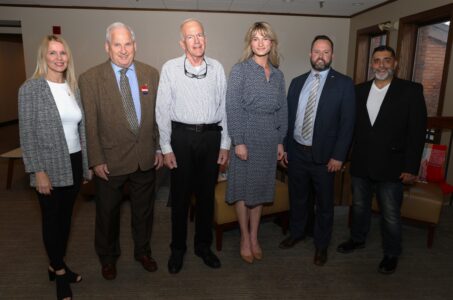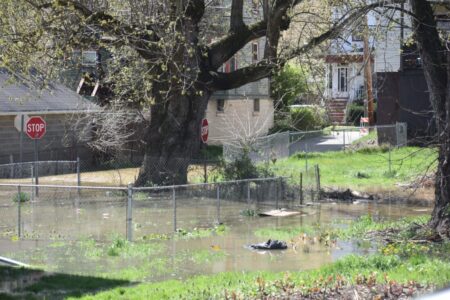West Virginia House of Delegates Passes Its Version of Income Tax Phase-Out

Photo Courtesy of W.Va. Legislative Photography House Finance Committee Chair Eric Householder, R-Berkeley, speaks Monday in favor of the House’s version of the personal state income tax phase-out. The House passed that version, while the version touted by Gov. Jim Justice remains stalled in committees.
CHARLESTON — The West Virginia House of Delegates sent the state Senate its version of a personal income tax phase-out Monday in a mostly party-line vote, while the bills for one big cut introduced by Gov. Jim Justice remain stuck in committees.
House Bill 3300, relating to reducing personal income tax rates generally, passed in a 77-23 vote Monday. Delegates Mick Bates, D-Raleigh, and Ed Evans, D-McDowell, voted with the Republican majority, while delegates Roger Conley, R-Wood, and George Miller, R-Berkeley, voted against the bill along with most of the Democratic caucus.
The bill also creates an Income Tax Reduction Fund from a portion of various sources of tax revenue and revenue collections. Once the ITR Fund reaches $400 million, $100 million gets transferred to the state’s general revenue fund, while the remaining $300 million acts as a buffer for economic downturns.
“There are no tax increases or any tax shifting of any kind in the bill before you,” said House Finance Committee Chairman Eric Householder, R-Berkeley, when urging members to vote for the bill. “It does give tax relief if you have any source of income.”
The Department of Revenue estimates the state will bring in $2.041 billion from the personal income tax in the next fiscal year starting July 1, with personal income tax revenue making up approximately 43% of collections to the general revenue fund.
An updated fiscal note submitted Friday by the Legislature’s Division of Regulatory and Fiscal Affairs estimated that HB 2022 would reduce personal income tax collections for calendar year 2022 by $75 million. Assuming that personal income tax annual growth remains constant, that tax could be phased out between 2034 and 2039, Director Peter Shirley said.
An additional fiscal note submitted Friday by the West Virginia Lottery stated skimming from its special revenue accounts — like KenoGo games, limited video lottery games and fees from expansion of limited video lottery terminals — could hurt bond repayments, services for seniors and tourism and reduce Promise Scholarship funding.
House Minority Leader Doug Skaff, D-Kanawha, said HB 3300 creates too much uncertainty as to whether future economic growth can offset the cuts required by the bill. Skaff also raised concerns about the effect of federal coronavirus stimulus money to both individuals and state and local governments creating a false sense of security to move forward with tax reform.
“We have artificial money coming into our economy this year from the federal stimulus money that we can’t rely on every year,” Skaff said, “but we’re going to base the next 12 years on this past year’s success on artificial money coming into our economy. That makes no sense.”
A Householder amendment to HB 3300 Monday moved the effective date of the tax cut from January 2022 to July 2022 to match the beginning of fiscal year 2023. That amendment also repeals the state’s marriage penalty. Unsuccessful amendments from Democratic lawmakers would have allowed for the future taxation of recreational cannabis and limited the tax cut to one year.
The House Finance Committee held a virtual public hearing Thursday on HB 3300. The West Virginia Chamber of Commerce expressed support for the House plan, in contrast to their opposition to Justice’s personal income tax cut plan. Chamber President Steve Roberts said the membership of the chamber believes HB 3300 to be a better tax reduction option.
“This bill applies to all income taxpayers,” Roberts said. “It does not pick winners and losers. The rates of reduction in income tax are important rates of reduction. They are significant and they are meaningful.”
Opponents of the bill believe it will cause cuts to government programs to keep up with the annual cuts to the personal income tax. They also believe that taxes will still have to be increased and likely shifted to middle class and low-income residents.
“House Bill 3300 is a bill that is neither modest nor a responsible alternative to the Governor’s plan,” said Kelly Allen, executive director of the left-leaning West Virginia Center on Budget and Policy. “This legislation takes away power from future legislatures to decide if economic and revenue conditions are right to cut taxes.”
House Bill 2027 and Senate Bill 600, the Governor’s tax reform plan, both remain lodged in their respective committees. Justice spent last week holding town halls in Morgantown, Beckley, and the Eastern Panhandle to gain public support for the plan, which would cut personal income tax rates by 60 percent starting in July for fiscal year 2022 and provide a tax rebate for residents earning less than $35,000 per year.
Justice’s entire tax proposal and tax rebate would decrease state tax revenue by $1.088 billion. Justice proposed $902.6 million in proposed tax increases to pay for the personal income tax cut. Business groups and tax reform organizations oppose the Governor’s plan because it does not cut personal income tax rates used by small businesses and sole proprietorships, removes tax exemptions on professional services, and raises excise taxes.






